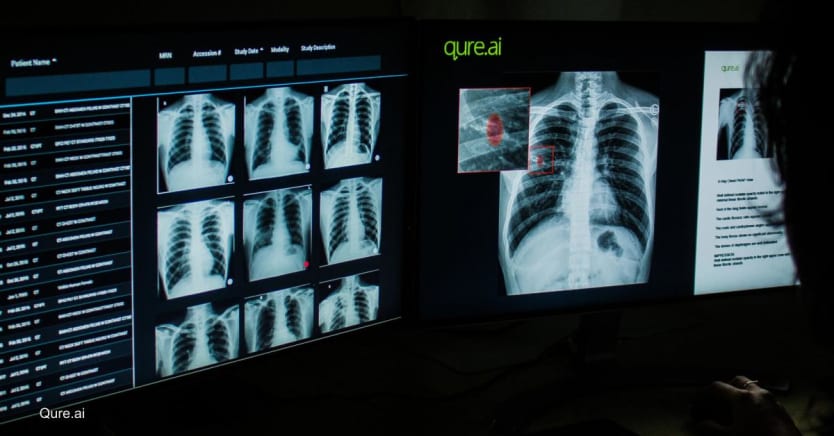
The attainment of a healthy and equitable global society has become an even more pressing universal priority since the beginning of the COVID-19 pandemic, as it further spotlighted and exacerbated the disparities in health care felt by low- and middle-income countries. AstraZeneca’s efforts toward achieving health equity were recently recognized in the 2022 Access to Medicine Index, where it placed third overall and first for product delivery, reflecting its commitment to increasing equitable and affordable patient access to treatments. AstraZeneca is working in partnership to achieve progress for all, particularly in LMICs.
Digital exclusion is one of the greatest barriers preventing people in LMICs from accessing health care information, diagnoses, care, and treatment. Strikingly, in 2021, it was estimated that 37% of the world's population — 2.9 billion people — are offline, with this group largely formed of people in LMICs.
Digital exclusion is compounded by a dwindling number of health workers, with an estimated shortfall of 10 million health workers expected by 2030, mostly in LMICs. This makes investments in technology vital in both meeting the needs of patients and alleviating the pressure on the current and future health workforce. In response, the health care sector is experiencing a growing digital transformation to address these challenges and close the gap between the richest and poorest in society.

AstraZeneca’s commitment to health equity
As part of this journey to a more equitable global society, AstraZeneca created the A.Catalyst Network — an interconnected and dynamic global network of more than 20 health innovation hubs, made up of both physical locations and virtual partnerships. The collective ambition is to address current health care challenges and increase affordable, equitable access to health care, in addition to scaling and showcasing patient‑enabled innovation through partnerships.
AstraZeneca is also proud to be a member of the World Economic Forum’s EDISON Alliance, a global movement of almost 50 leaders from the public and private sectors, to deliver impact on digital inclusion by increasing access to affordable and accessible solutions. As part of the 1 Billion Lives Challenge, a pledge to improve one billion lives through digitally inclusive services, AstraZeneca has committed to screening five million patients for potential lung cancer by 2025 through its partnership with Qure.ai, a leading heath-tech firm that uses artificial intelligence for reading and interpreting radiology images. This technology is designed to facilitate the early detection of lung cancers, by utilizing AI to help interpret radiology images efficiently.
As one of the most common forms of cancer globally and the leading cause of cancer deaths worldwide, lung cancer is a significant priority for AstraZeneca. In partnership with the International Association for the Study of Lung Cancer, Guardant Health, and the Global Lung Cancer Coalition, AstraZeneca is part of the Lung Ambition Alliance, formed with the goal of eliminating lung cancer as a cause of death.
The majority of lung cancer deaths occur in LMICs, and cancer services are far less commonly covered by governments’ health financing schemes. Early detection of lung cancer is crucial and often challenging in LMICs due to a combination of factors, including access to resources and long waiting times, which deter patients from seeking care.
AstraZeneca is scaling up Qure’s AI-powered chest x-ray interpretation tool, which is designed to distinguish lung nodules in under a minute and minimize the chances of lung cancers going undetected. Importantly, this tool is being accessed in primary care, where x-rays are utilized most commonly. To date, the partnership has led to approximately 85,000 scans in 21 countries, with high malignancy risk lung nodules identified in 0.9% of scans. In addition, it is partnering with tuberculosis screening programs across the world to introduce an integrated lung health screening approach that leverages existing infrastructure to expand screening programs cost-effectively.
Collaborating to tackle country-specific challenges
AstraZeneca is also working to help improve the care of people with cardiovascular diseases in India, where they are a leading cause of death. The India Health Innovation Hub launched Project Heart Beat in 2020 together with Tricog — a leading provider of AI-based cardiovascular diagnosis tools — to address the unmet need for early diagnosis in patients with suspected heart attacks.
Gagan Singh, country president at AstraZeneca African Cluster and former country president and managing director at AstraZeneca India, explained: “This vital project focuses on supporting people who live in small remote towns where health care resources are scarce, by applying AI to interpret the results of electrocardiograms, or ECG, to help detect if a patient has experienced a heart attack. Tricog’s InstaECG machine allows ECG readings to be taken within moments and enables a cloud-based screening of the reading via a digital app. Since launch, Project Heart Beat has been rolled out in 31 locations and screened more than 63,000 patients.”
Sameh ElFangary, country president for the Gulf Cooperation Council and Pakistan at AstraZeneca, said: “We are also thrilled to be working with Abu Dhabi’s Department of Health, which has recently joined the A.Catalyst Network, to help reinforce their position as an incubator of life sciences and innovation.”
AstraZeneca is excited to continue its partnership with the EDISON Alliance, Qure.ai, Tricog, and other partners around the world, including government departments. By working together to evolve and support the development of innovative, forward-thinking health care solutions, AstraZeneca can help build a more digitally inclusive future that will improve equity in health care.










